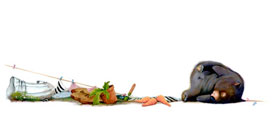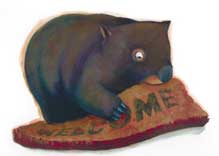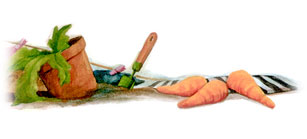Intro | Wombat News | Latest Books
Awards | Schedule for 2014 | April Garden
Mad for Muffins
Three festivals and two time zones in one week, plus the premier of Pete the Sheep.
Baa. Excuse me. Am still a bit dazed.
But it was wonderful. Magic. Monkey Baa’s musical brought back every memory of the time and place Pete the Sheep came from, because there was a sheep, though his name was Dunmore, not Pete, and a half serious half desperate plan to give sheep to preschools in the drought. We’d become a troupe of wandering shearers giving the most gorgeous haircuts in Australia. I’d have cried, just a little, at Pete the Sheep, especially as Ratso’s harmonica mourned into the darkness, except I was laughing too much.
Before the curtain went up, the sophisticated kid next to me had declared he didn’t like musicals. He thought he was far too mature for Pete the Sheep. Within forty seconds he was giggling too hard to stay in his seat.
‘Do you like musicals now?’ I asked him afterwards.
‘Yep,’ he said.
Pete is still in Sydney, but will be travelling soon to 54 theatres around Australia this year, so it will becoming to one near you. But the festivals were superb, too. I’ve written about them more fully on the Laureate web-site blogs, the magnificent Wheeler Centre in Melbourne, Better Beginnings with the State Library of WA and Storylines in Perth.
Wombat News
And while I was away it rained. And rained. We’ve had two weeks with one sunny morning and a patch of blue sky one afternoon. Not that I’m complaining. I don’t think I can ever complain about rain again. The grass is green and long, the wombats fat, the wallabies well stuffed and fluffy, so well fed with grass they haven’t even nibbled the pelargoniums lately.
Little Phil is still small, but round rather than square, and fluffy, and so content with his wombat palace down the end of the orchard – hundreds of metres of ancient wombat tunnels, going back perhaps hundreds of years, the wombat equivalent of inheriting Windsor Castle without the tourists, guides and cameras –and possibly not so cold and damp… anyway, Phil is so blissed out on grass that he doesn’t even sniff at my footprints in the grass anymore, or look longingly at the windows hoping for carrots.
Latest Books
The Hairy-Nosed Wombats Find a New Home (with Sue de Gennaro).
Celebrate Hairy-Nosed Day on May 8 and wear whiskers for wildlife to raise money for endangered animals with this new book. It is a good news story – how the last 35 of the world’s most endangered species, the Northern Hairy-Nosed Wombat, began to turn into a growing, thriving population as volunteers raised money to protect their home. Now the wombats need a second home and with Sue’s enchanting pictorial interpretation (those whiskers are divine) they set out to find it…..
Google The Wombat Foundation to find out how you can join in Hairy-Nosed Day. All my proceeds from the book will go to the Wombat Foundation and in helping to ensure a safe future for Hairy Noses – and other whiskery wildlife too.
Fire (With Bruce Whatley)
Fire is what happens when Bruce and I have three years to produce a book – not three weeks as we had to do with Flood to raise money for the Queensland Premier’s flood appeal. Fire is astounding: Bruce’s artwork goes from genius to sublime. Only Bruce could do a centre-spread of fire that sparkles with red and makes it beautiful, makes even the terror beautiful. It is always the most extraordinary privilege to work with him.
Refuge
A young man survives a sea journey when his boat is hit by a freak wave and arrives in the Australia he had dreamed of. But his companions in the game on the beach come from many different times and have their own Australias. Together they learn to accept reality – and each other.
Let the Land Speak: how the land created our nation
This is a re-interpretation of Australian history, focusing on how the land itself, as much or more than social and political forces, shaped the major events that led to modern Australia.
Our history is mostly written by those who live, work and research in cities but the land itself has shaped our history far more powerfully and significantly than we realise. Let the Land Speak reinterprets the history we think we all know – from the impact of indigenous women, whose activities shaped their nations far more profoundly than firestick farming did, to the Eureka Stockade and to the role of the great drought of the 1890s in bringing about Federation – the land has shaped our past. Let the Land Speak also provides insights into ways we can read the land, predict the future – and survive it.
Down the Road to Gundagai
This is the third in the Matilda saga, following A Waltz for Matilda that began in 1892 and continued with The Girl from Snowy River set in 1919. Each book can be read separately or as part of the series.
In Down the Road to Gundagai, Blue Lawrence has escaped the prison of her aunts’ mansion to join The Magnifico Family Circus, a travelling troupe that brings glamour and laughter to country towns gripped by the Great Depression. Blue hides her crippled legs and scars behind the sparkle of a mermaid's costume; but she’s not the only member of the circus hiding a dark secret. The unquenchable Madame Zlosky creates as well as foresees futures. The Bearded Lady is a young man with laughing eyes. A headless skeleton dangles in the House of Horrors.
And somewhere a murderer is waiting… to strike again.
The Road to Gundagai is set in 1932, at the height of the Great Depression. Matilda is still running Drinkwater Station, but has put aside her own tragedy to help those suffering in tough economic times and Joey, from The Girl from Snowy River, uses his new medical skills to solve a mystery.
And the wombat is back! When a Wombat Goes to School is simple and hilarious and showcases Bruce Whatley at his wickedest. The scene outside the Principal’s office is priceless. We had enormous fun with it. And I suspect that kids will have even more.
Awards
Refuge has just been named a Notable Book by the Children’s Book Council of Australia, and short-listed for the NSW Premier’s Award in both the Patricia Wrightson and the Community Relations sections. It was shortlisted for the 2014 Aurealis Awards (Australia’s premier speculative fiction awards) Best Children’s Book too.
The children’s award was won by the superb The Four Seasons of Lucy McKenzie, by
Kirsty Murray. The winners of the Young Adult section were These Broken Stars, by
Amie Kaufman & Meagan Spooner, and Fairytales for Wilde Girls, by
Allyse Near. If you have a mob of boys who have discovered they don’t like reading, try giving them books on the Aurealis shortlist. And those on the CBCA, Premiers’ Award, Prime Ministers Award and Cool Kroc and Koala Awards shortlists too: a great place to start a hunt for the perfect book to hook a kid into reading. No, they won’t love them all; or even most of them. But there are good odds that there will be one they read and reread, and then pick up another…
Schedule for 2014
There are more bookings still being finalised to be added, but this is what’s been confirmed so far. If I can’t get to your school or preschool, then a video conference may be possible, arranged through HarperCollins, Jacqui.Barton@harpercollins.com.au.
You can also download videos of talks about various books or workshop ideas from the excellent HarperCollins’ Teachers’ Hub. Go to www.harpercollins.com.au and click on Teacher’s Hub (there are also excellent teacher’s notes for most of my books) or contact Jacqui Barton, Education Manager, HarperCollins at the email address above.
Invitations to speak should be sent to the Laureate Office, or check the Laureate web-site, www.childrenslaureate.org.au, for schedule updates. If I’m in your area then I’ll try to fit in any other invitations.
May 6-8 – Adelaide, talks to schools
9 May – MANTLE conference (annual professional conference for teacher librarians in the Maitland, Newcastle, Taree, Lake Macquarie and Central Coast districts), Newcastle.
11 May – Araluen, Open Garden Day: contact Open Garden Scheme.
17-18 May – National Children’s Book Council of Australia (CBCA) conference, Canberra.
19 May – CBCA visit to our property.
21 May – National Story Time at the National Library, Canberra.
23 May, 2 pm – History Council of Australia panel at the Sydney Word Festival.
24 May – Colin Simpson Memorial Lecture, Australian Society of Authors, Melbourne
9-12 July – ALIA conference, Darwin, and other talks in the Northern Territory.
8-10 August – Bendigo Literary Festival, Bendigo.
23-26 August – Sessions at the Melbourne Writer’s Festival.
27 & 28 August – Christchurch Writer’s Festival, New Zealand.
29 August-2 September – Storylines Festival, Auckland and Wellington, New Zealand.
1 October. History Teachers Conference, Brisbane
22 October – Launch Children’s Day, ACT.
8-9 November – Araluen Open Garden Days. Contact the Open Garden Scheme.
14-22 November – Port Hedland, WA.
The April Garden
This is the brassica time, which sounds boring, except crisp heads of brocolli are magic when picked on a frosty morning, all sweet from winter. Spring-time cauliflower soup, frost-kissed kale, sulphurous and stringy in summer but comes into its own in winter. There’s just time too (I hope) to get winter flowers from Iceland poppies.
A Passion for Pomegranates
The pomegranates are turning golden – the leaves, that is. The fruit is fat and ripe. Pomegranates like hot dry summers i.e. here. Once established they'll fruit even in severe drought, and flower and look decent too.
They are one of the prettiest fruit trees, with bright orange flowers in November, brilliant yellow autumn leaves and great globulous fruit that hangs all winter or till the birds eat it – but watching the birds cavort eating the pomegranate seeds is pretty spectacular too.
Make sure you buy a fruiting pomegranate – there are some varieties that are just grown for flowers and leaves. Among other pomegranate varieties we grow a semi-dwarf one here, that grows to about 2 metres; there are smaller fully dwarf varieties and full sized ones too – ours is about four metres high now and still growing, and we get masses of fruit from both.
Don't bother about pruning, except to tidy it or cut out dead wood. Plant the trees about two metres apart for dwarf varieties to four metres for full sized trees, or between one and two metres apart if you are growing them for a pomegranate hedge.
Pick the fruit in late autumn. Some varieties are bright red, others mostly yellow with a red blush. The best way to tell if they are fully ripe is to wait till the birds start eating them, though if you want to eat the crunchy unripe seeds in salads, pick them when they are fist sized. Some fruit will probably split too, especially if the year has alternated between very wet and very dry. Our pomegranates have been confused this year, blooming sporadically from November to January, so we have fruit at various stages of development.
Ripe pomegranate fruit is eaten by sucking up the seeds with the red gel around them, then spitting the seeds out and swallowing the juice. Sucking iced pomegranate seeds is one of the most refreshing things known.
Grenadine Syrup
Layer equal amounts of caster sugar and pomegranate seeds with their gel in a large bowl. Leave overnight, stirring a few times before you go to bed. The sugar will extract the juice from the gel and in the morning there'll be a thick red liquid in the bowl.
Strain off the juice, throw the seeds to the chooks, and boil the juice for five minutes and bottle in sterilised bottles (not that I ever have bothered sterilising...). You now have grenadine syrup. Use as a cordial, with water or add to Tequila Sunrises, or use to make pink milkshakes – very good indeed – or pour a dash over ice-cream. Keep in a cool place for up to a month. Freeze for longer periods. Throw out if it grows mouldy, bubbles, or looks or smells different from what it was when it was first made.
Muffin Magic
Green Fetta Muffins
2½ cups SR flour
1 cup buttermilk
4 tbsp butter, melted
2 roasted capsicum, skinned (about ¾ cup finely chopped roasted capsicum)
½ cup feta, cut into small pieces
4 tbsp chives, finely chopped
3 tbsp parsley, finely chopped
1 egg, lightly beaten.
Mix all gently, divide into greased and floured muffin cases. The cooking time will depend on the size of each muffin, from 12-29 minutes, till they are risen and firm when pressed with your finger or a knife. Don’t overcook or let them get crusty on top.
Eat at once, while still warm.
Fruity Orange Muffins
½ cup sultanas, soaked in apple or orange juice overnight till plump and soft
½ cup currants, soaked the same way, well drained
2 cups SR flour
125 gms brown sugar
4 tsp finely grated orange zest
2 eggs
½ cup cream
3 tbsp Cointreau or orange juice (The latter is not nearly as richly flavoured.)
Cream butter and sugar; beat in the eggs one by one then gently fold in the other ingredients. Mix all gently, divide into greased and floured muffin cases. The cooking time will depend on the size of each muffin, from 12-29 minutes, till they are risen and firm when pressed with your finger or a knife. Don’t overcook or let them get crusty on top.
Eat at once, while still warm.
Moist Coconut and Cherry Muffins
2 cups SR flour
125 gm butter
1 cup dessicated coconut
2/3 cup caster sugar
1 egg, lightly beaten
1 cup coconut cream, or ordinary cream
1 cup crystallised cherries, finely chopped
Optional: ½ cup dark chop chips
Cream butter and sugar; beat in the eggs one by one then gently fold in the other ingredients. Mix all gently, divide into greased and floured muffin cases. The cooking time will depend on the size of each muffin, from 12-29 minutes, till they are risen and firm when pressed with your finger or a knife. Don’t overcook or let them get crusty on top.
Eat at once, while still warm.
Quick Date and Walnut Muffins
2½ cups SR flour
125 gm butter
1 cup brown sugar
1¼ cup buttermilk
1 egg
1 cup fresh dates, finely chipped
½ cup walnuts, finely chopped.
Optional: 3 tbsp Cointreau and 2 tsp orange zest, finely grated
Melt butter. Take off the heat and add the sugar, then beat in the egg. Fold in the other ingredients gently.
Divide into greased and floured muffin cases. The cooking time will depend on the size of each muffin, from 12-29 minutes, till they are risen and firm when pressed with your finger or a knife. Don’t overcook or let them get crusty on top.
Eat at once, while still warm.
|


